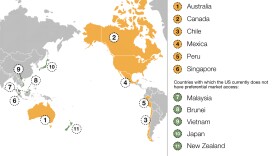By Brian Clardy
http://stream.publicbroadcasting.net/production/mp3/wkms/local-wkms-769607.mp3
Murray, KY – After having won gold and bronze medals in the 200 meter race, U.S. Olympians Tommie Smith and John Carlos made a bold and defiant gesture. As they stood on the platform to receive their medals to the strains of The Star Spangled Banner, both men wearing black gloves raised their fists in angry boldness. They had offered the Black Power salute. As a result, both athletes were suspended from the games and forced to leave the Olympic village.
That singular act of insolence must be placed in the context of that bitter year.
The War in Vietnam had reached its apex as the Tet Offensive raised questions about the Johnson Administration's credibility and the efficacy of the war itself. Serious doubts began to be raised about the war, and student protestors (Black and White) grew more angry and frustrated as the war continued unabated.
The riots at the 1968 Democratic National Convention in Chicago served as a poignant reminder of how deeply the country was divided. Earlier that year, entertainer Eartha Kitt made a career altering move by challenging Johnson Administration policy at White House function, much to the chagrin of First Lady Lady Bird Johnson.
Civil rights protests at the University of Wisconsin and the University of North Carolina, as well as at a number of colleges and universities raised questions about the role of equality in America, and these demonstrations were often met with harsh resistance by the community power structure.
In February 1968 three African American students were killed in Orangeburg, SC during protests over discrimination at an area bowling alley. The Orangeburg Massacre became a very important flashpoint in the Civil Rights movement that was a precursor of
equally tragic events to come.
On April 4, 1968, the Reverend Dr. Martin Luther King was shot to death in Memphis, TN. This event triggered massive riots and violence in well over 100 cities, including the nation's capital, Washington, DC. A few months later, presidential candidate and Senator Robert F. Kennedy was killed in Los Angeles after winning that state's presidential primary. Kennedy was considered a major supporter of civil rights and his death marked another bloody milestone in the history of that struggle.
Many Americans were disillusioned over the state of the country and the world. There was an environment fraught with tension between races, generations, and regions. It would be a bit melodramatic to call those Civil War like conditions, but the country was polarized and a deep seated anger had taken hold among its people like a tortuous vice grip.
So when Tommie Smith and John Carlos took center stage with their act of non-cooperation and protest, it shook both the Olympics (and an already divided America) to its foundations. International sports had been politicized and the world (already numb with disenchantment) was left with one more reminder of just how bad things had become.




